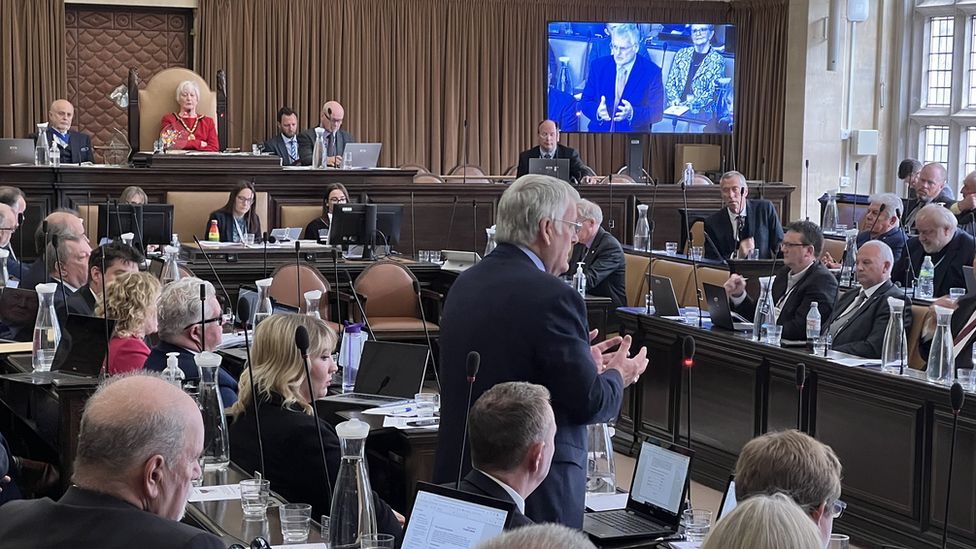ARTICLE AD BOX

By Becky Morton
Political reporter
Forcing councillors in England to attend meetings in person is leading to some quitting, councils have warned.
A legal requirement to hold full council meetings in person was temporarily dropped during the pandemic but reintroduced in May 2021.
A survey by the Local Government Association (LGA) found one in 10 councils had seen members stand down since then due to the change.
The government said in-person meetings were important for accountability.
Under 50-year-old laws, councils are required to hold certain meetings, such as planning and full council, in person.
However, during the pandemic, they were temporarily allowed to hold these meetings virtually until May 2021.
The LGA, which represents councils in England, said the recruitment and retention of councillors, especially those who were disabled or had other jobs or caring responsibilities, would be hampered if councils were not able to hold hybrid meetings.
According to the latest figures, 32% of councillors in England are in full or part-time employment, while 46% have caring responsibilities.
The LGA is backing an amendment tabled by Conservative peer Baroness McIntosh to the Levelling-up and Regeneration Bill, which is currently going through Parliament, which would allow councils to meet virtually.
Sam Murray, who is a Conservative councillor in Suffolk, has a disability which affects her mobility and means she sometimes has to use a wheelchair or mobility scooter.
She was elected in May 2021, when the requirement to attend full council meetings and certain committee meetings in person returned.
The 36-year-old said when she did attend using her mobility scooter, the experience was "exhausting" and "degrading" as she had to be lifted into a chair and then could not leave to go to the toilet during the meeting.
If an individual fails to attend any meetings for six months they automatically cease to be a councillor.
However, Sam said she was primarily concerned with representing her local community and other disabled people effectively.
"Attendance is really important to me so I will push myself as much as possible physically to get there and it can have a detrimental consequence on my health later," she told the BBC.
As a member of the planning committee she said she had been able to ensure the needs of disabled people were taken into account in developments and push for a disability consultee for planning applications.
The single mum of two young children said childcare could also be an issue for council meetings which were in the evenings and if her children were unwell she often could not attend.
"I feel like I have extra pressure because there's not many people like me on the council," she added.
Sam said she believed the requirement to attend some meetings in person put some people off standing for election and she had spoken to several councillors who were planning to stand down because of the policy.
She has already left other council committees she was part of because of the need to attend meetings in person.
"I love being a councillor. However, it is incredibly difficult for me to be able to do this and it does cross my mind whether I can carry on doing it," she said.
"These kinds of barriers don't need to be there because we've got the technology - it's just we're not legally allowed to use it for public meetings."
Image source, Sam Murray
Image caption,As a councillor Sam has championed the needs of disabled people, including campaigning for Suffolk's first swing designed for disabled children
The LGA surveyed around a third of local authorities in England and found 95% of these wanted the power to be able to reintroduce virtual or hybrid meetings. No council wanted to hold fully virtual meetings but the overwhelming majority wanted hybrid options for councillors who needed them.
Previous LGA research also found when hybrid meetings took place during the pandemic, public attendance increased.
Joe Harris, vice-chairman of the LGA, said: "Good decision-making needs people who reflect the range of experiences, background and insight that exist in their communities.
"However, councillors are restricted by law to attend council meetings in person, which can deter a range of people including full time professionals, parents of young children, carers, workers and disabled people from stepping forward to represent their communities."
A consultation on remote council meetings closed in June 2021, with a government response expected shortly.
A Department for Levelling Up, Housing and Communities spokesman said: "While remote meetings gave councils the necessary flexibility to support businesses and communities during the Covid-19 pandemic, we believe physical attendance at meetings remains important, not just to build strong working relationships but to deliver good governance and democratic accountability.
"It is right that councillors regularly meet and debate in person so that communities can hold their council to account."

 1 year ago
113
1 year ago
113








 English (US) ·
English (US) ·